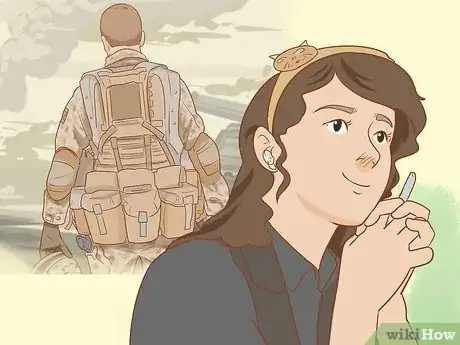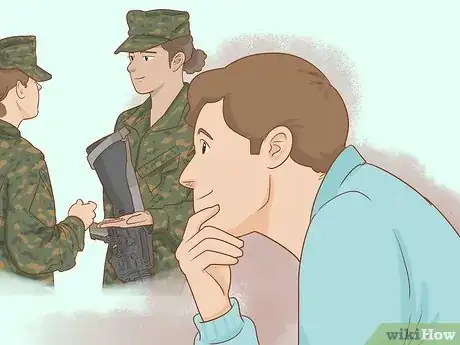This article was co-authored by Elvina Lui, MFT. Elvina Lui is a Licensed Marriage and Family Therapist specializing in relationship counseling based in the San Francisco Bay Area. Elvina received her Masters in Counseling from Western Seminary in 2007 and trained under the Asian Family Institute in San Francisco and the New Life Community Services in Santa Cruz. She has over 13 years of counseling experience and is trained in the harm reduction model.
There are 8 references cited in this article, which can be found at the bottom of the page.
This article has been viewed 37,093 times.
Just like with any other relationship, dating someone who's in the military can have its benefits and its challenges. However, non-military relationships don’t always have to endure the distance, rules, and time apart that military relationships often do. Fortunately, with a little adjustment and dedication, you can overcome these challenges. To be a military girlfriend or boyfriend, keep your relationship strong, find ways to stay happy during the hard times, and show your support.
Steps
Keeping Your Relationship Strong
-
1Have good communication. Communication is the key to success in any relationship, but is especially important in military relationships. Be open, honest, and understanding with your partner about all things good and bad in order to keep your connection strong, even when miles apart.[1]
- Before deployments and any other long separations, be sure to sit down with your partner and have a serious talk about both of your expectations, concerns, and feelings. It’s crucial to be on the same page.[2]
- When you and your partner disagree on something, make sure to hear them out. When it’s their turn to talk, put your opinions aside for a moment and truly listen to what they’re saying.[3]
- Don’t resort to blame, name-calling, or silent treatments when you’re upset. Instead, respectfully and directly confront your partner about the problem.
-
2Communicate in whatever way you can. Depending on which branch of the military your significant other is in, you’ll most likely have limited contact from time to time and only be able to communicate with them by letter, email, phone call, video call, or through social media. Take full advantage of this and write as many letters and emails as you can, even if you don’t receive many. Keep your phone near you at all times, just incase your partner has a couple minutes to talk.
- When you’re far from each other, every bit of contact you have with your partner is beneficial to your relationship.[4]
- While it isn’t as good as as true physical contact, Facetiming or Skyping your significant other is the next best thing. Video call your partner as often as possible, as this may help you feel more connected than other forms of contact.
Advertisement -
3Allow for an adjustment period when your significant other comes home. After you’ve spent a lot of time apart, whether your partner was at boot camp or deployed, you’ll both need some time to adjust. Most likely, it’ll be really exciting to be reunited but then adjusting to day-to-day life together may feel difficult because you’ll both have to change the routines you were just in.EXPERT TIPElvina Lui is a Licensed Marriage and Family Therapist specializing in relationship counseling based in the San Francisco Bay Area. Elvina received her Masters in Counseling from Western Seminary in 2007 and trained under the Asian Family Institute in San Francisco and the New Life Community Services in Santa Cruz. She has over 13 years of counseling experience and is trained in the harm reduction model.Marriage & Family Therapist

 Elvina Lui, MFT
Elvina Lui, MFT
Marriage & Family TherapistUnderstand that your partner may act differently. Elvina Lui, marriage and family therapist, tells us: "Serving in the military typically means adapting a new mindset. It is a very different way of being. The normal level of autonomous thought and action is sacrificed for better team work, which also fosters a brother-like bond. This specific change might not have a direct impact on the relationship, but know that serving in the military changes a person."
-
4Wait a year before making big relationship decisions. You may feel a lot of pressure from others in the military community or just because of circumstance to make major decisions early on in the relationship. In order to give the relationship the best chance possible, resist the urge to move across the country or marry your significant other until you’ve been dating for at least a year.[5]
- You may quickly learn that there are a lot of benefits to marrying your partner, including higher pay for your partner and free health insurance for you. Don’t rush into anything before you’re truly ready just because it would make things easier.
Staying Happy During Tough Times
-
1Keep a positive mindset. Although it isn’t always easy to do, having an optimistic attitude can make all the difference in the world when you’re dating someone in the military. Do your best to see the good in every situation and develop patience and understanding.[6] Some ways to achieve this include: practicing positive self-talk, smiling more, and keeping a daily gratitude journal.[7]
- Sometimes deployments get extended and orders get changed last minute. In the military world, it’s best to practice realistic optimism and expect the worst but hope for the best.
-
2Stay busy. As the girlfriend or boyfriend of a military person, it’s easy to get wrapped up in missing them and let yourself wallow. Instead, focus on your own personal goals and independent happiness.
- Take a few classes at the local college, join a book club, pick up an extra shift, or sign up and train for a 5K that’s coming up to fill your time in a productive, fun way.[8]
-
3Make new friends. You’re much less likely to feel lonely if you surround yourself with good friends. Invest in both old and new friendships that you have so that you can have a support system for the challenging times and also have fun experiences while your partner is away.
- Spend some time with other military significant others. These people know what you’re going through and are often welcoming and supportive.[9]
-
4Come to terms with not having control. There are a lot of rules and demands in the military, and there may be many holidays that you won’t be able to spend with your partner and many important details about missions that will be kept from you. Do your best to accept that you can’t change these things, and try to make the most of the situation.[10]
- Whenever you get overwhelmed about things being out of your control, try slowly counting down from 10 with your eyes closed. If this doesn’t work, you can try talking it out with a close friend, destressing through exercise, or focusing on helping someone else.[11]
-
5Accept the distance. Whether it means distance from your family or distance from your significant other, you’ll have to be okay with being far away from loved ones. This is just a part of the military lifestyle. A benefit to this is that the military may allow you to visit and live in many places you’ve never been to before.[12]
Showing Support
-
1Stay positive in your emails, letters, and calls. While it can be difficult, try not to show any sadness or frustration when you do have a special moment to talk to your spouse. Keep in mind that boot camp and/or deployments can be really hard on them too, and what they need is your positive support and reassurance.
- Try to leave out any bad things that have happened to you lately and instead be upbeat in telling them how much you love and miss them.
- Give them encouraging pep talks and say things like “I believe in you.”[13]
-
2Don’t give up. Being separated from the person you love is no easy challenge to overcome. Some moments will feel harder than others and sometimes you may even doubt the relationship. Do your best to stay strong during these moments of weakness. You may regret making rash decisions about the relationship when your judgment is clouded by sadness and loneliness.
- Don’t break up with your significant other or cheat on them while they’re away.[14]
-
3Accept your significant other’s career choice. Choosing to be the in the military is not always an easy decision to make, so when you choose to be with someone in the military, respect their choice. At the end of the day it was their decision, not yours.
- Do not talk down about the military, regardless your past experiences (i.e., a past negative relationship within the military or negative "military brat" experience).
References
- ↑ https://psychcentral.com/blog/archives/2009/04/14/9-steps-to-better-communication-today/
- ↑ https://www.spousebuzz.com/blog/2014/03/military-girlfriend-guide-to-a-first-deployment.html
- ↑ https://psychcentral.com/blog/archives/2009/04/14/9-steps-to-better-communication-today/
- ↑ http://www.military.com/spouse/military-life/newbies-and-brides/how-spouses-survive-boot-camp.html
- ↑ http://www.themilitarywifeandmom.com/military-girlfriend-best-pieces-of-advice/
- ↑ http://www.themilitarywifeandmom.com/military-girlfriend-best-pieces-of-advice/
- ↑ https://daringtolivefully.com/positive-attitude
- ↑ http://www.military.com/spouse/military-life/newbies-and-brides/how-spouses-survive-boot-camp.html
- ↑ https://www.spousebuzz.com/blog/2014/03/military-girlfriend-guide-to-a-first-deployment.html
- ↑ http://www.semidelicatebalance.com/2015/03/20/15-things-to-know-about-dating-a-military-man/
- ↑ http://stronginsideout.com/frustrated-cant-control/
- ↑ http://www.semidelicatebalance.com/2015/03/20/15-things-to-know-about-dating-a-military-man/
- ↑ https://blog.sandboxx.us/2015/09/11/military-girlfriend-101-what-you-need-to-know/
- ↑ https://blog.sandboxx.us/2015/09/11/military-girlfriend-101-what-you-need-to-know/






































































